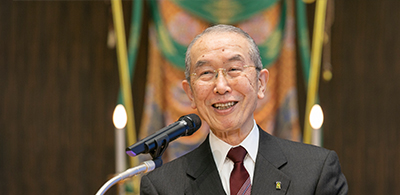Avoiding the Second Arrow
December 2015

Do Not Be Obsessed by Emotions
Tanzan Hara (1819–92), the well-known Zen monk and Buddhist scholar of the late Edo and Meiji periods, is the subject of the following anecdote.
In the course of his travels to many places as an itinerant monk, Tanzan once approached a riverbank. No bridge or ferry was nearby, so both he and his fellow itinerant monk disrobed in order to cross the river when they happened to see a young woman who was having the same difficulty. Tanzan did not hesitate to speak to her and to carry her across the river on his back, and then as if that were nothing, he resumed walking.
However, a while later his fellow itinerant monk, with a stern expression, said, “As someone who has renounced domestic life, are you not ashamed to have come into such contact with a woman?”
A natural deed that was imbued with compassion, when seen from a different perspective could appear to be neglecting the Buddhist precepts. Having been told this, however, Tanzan immediately replied, “Are you still holding on to that young woman? When I put her down by the riverbank, I did so completely.”
Along with the warmth of his compassion, this story casually tells us the importance of not becoming obsessed with one idea. Similarly, we come into contact with many things every day, experiencing a variety of emotions—joy, anger, sadness, and pleasure. For human beings, this is only natural, and Shakyamuni called each of these emotions “the first arrow.”
Among the emotions held in our hearts, however, we wish that those we like would be stronger and last indefinitely, and so we become attached to them. In contrast, we avoid and keep away the unpleasant emotions. At such times the desire that arises in us and our self-centered perspective cause suffering for us and deepen our worries.
Then, how can we save ourselves from drowning in the sea of suffering and pleasure? The answer, according to Shakyamuni, is not to become obsessed by the first emotion we feel; in other words, not to be hit by “the second arrow.”
Controlling One’s Emotions
It is rather difficult to be just like Tanzan Hara, and at the time and the place that emotions well up inside us we are unlikely to “put them down” easily and be done with them, never feeling anxiety or anguish.
Let me share a personal story. In the past, I was afflicted with cystitis, a bladder inflammation. It was so painful that I thought, “I hope I never have to experience this again.” Since then, if the condition bothers me even a little, I am careful to immediately hydrate myself in order to prevent a renewed inflammation.
In other words, having learned a lesson from my pain, I became more careful, and it is the same thing with feeling anguish. Once one has experienced being carried away by one’s own emotions and being driven by pain, one learns to be more careful and not to be hit by such a “second arrow.”
I have heard that some people who have an annual physical examination have been told repeatedly to be more careful about the same health issue and to make an effort to improve, but they only come to realize the importance of good health for the first time when they experience terrible pain. Looking at things from that situation, it might be said that experiencing pain and learning a lesson from it is an admonishment from the Buddha not to be hit by the “second arrow” and to take steps leading toward one’s emotional maturity.
Of course, if it is possible both spiritual and physical pain are experiences that we do not wish to have. Therefore, it is essential to prevent one’s desires and attachments from driving one, and so not to be hit by a second and even a third arrow.
Among Zen adherents there is a saying, “Add not a second thought.” This means that even if delusions well up inside of us we should not chase after them or let ourselves become engulfed in miscellaneous thoughts, and not let the thoughts that do arise in our mind be magnified by illusion. For example, when you happen to see some delicious-looking yet calorie-rich food and think “I would like to have some of that,” if you can stop the thought right there, your pocketbook will not shrink, the food will not have any damaging effect on your body, and you will not experience suffering.
Delusions and suffering are produced by ourselves. If we can control our emotions well, therefore, we can spare ourselves unnecessary unpleasantness.
Back Number



